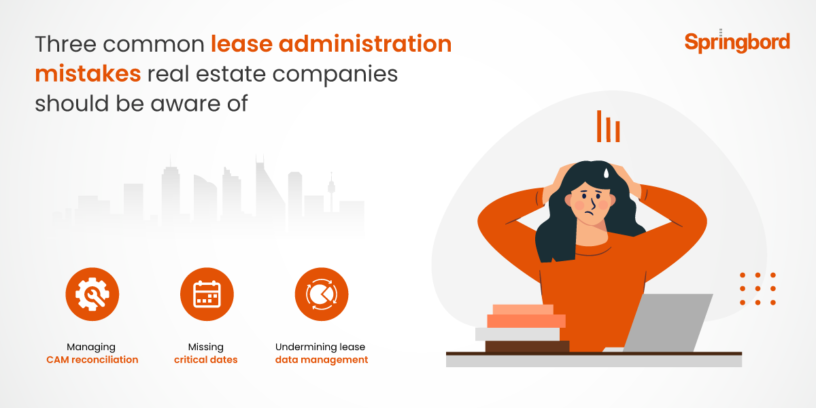 Read time 2 min
Read time 2 minLease administration plays a key role in efficiently managing lease portfolios and driving maximum returns. However, despite the high stakes most real estate companies, struggle to streamline lease administration. As a result, even minor errors end up impacting business significantly with companies running into hundreds of thousands of dollars in loss.
Financial and operational risks can impact both business and brand reputation. It is therefore important to be aware of these mistakes, in order to remediate them in time before these errors cause significant damage and hurt the lease portfolio.
Managing CAM reconciliation
Common area maintenance (CAM) reconciliation is probably the most error-prone part of lease administration. It is a tedious, complex, and time-consuming process that demands attention and skill. These operating expenses are imperative to ensure proper upkeep of the property, that said it is also one of the expenses on the lease that are contentious and often lead to landlord-tenant disputes. Issues such as poor expense allocation, misinterpretation of the lease, or simple calculation errors are all too common. Such mistakes can result in over or undercharging tenants and delayed invoicing, hurting not only recovery but also relationships with tenants.
Missing critical dates
Missing critical dates can really have a domino effect resulting in loss of money, resources, and time. Lease expiration, option notice, insurance expiration, rent escalations are but a few dates that need to be tracked closely in order to manage the portfolio effectively. However, given the volume of work real estate managers have at any point in time, missing critical dates is an all too common mistake that leads to a whole lot of operational and financial challenges later.
Undermining lease data management
Managing voluminous lease data demands resources, tools, and skills. Despite its growing criticality in ensuring timely and compliant lease accounting and reducing risk and tapping into newer opportunities, most companies are still grappling to streamline lease data management. Given the lack of time, proper tools, and resources, real estate companies often end up with poor lease data extraction, collection, and in turn quality that negatively impacts several other operations. Poor data management also severely restricts a company’s ability to improve efficiency, tap into new opportunities, manage risk effectively, and gain a competitive advantage.








